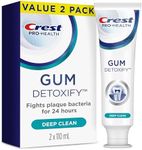Buying Guide for the Best Fluoride Toothpastes
Choosing the right fluoride toothpaste is important for maintaining good oral health. Fluoride toothpastes help to strengthen tooth enamel, prevent cavities, and keep your teeth clean. When picking a toothpaste, it's helpful to understand the key features and ingredients that make a difference, so you can select one that matches your dental needs and preferences.Fluoride ContentFluoride is the main active ingredient in these toothpastes, and its concentration is usually measured in parts per million (ppm). Most adult toothpastes contain between 1000 and 1500 ppm of fluoride. Higher fluoride levels offer more protection against cavities, but for children or people with sensitive teeth, lower levels may be recommended. When choosing, consider your age and risk of tooth decay—adults and those prone to cavities should opt for higher fluoride, while children should use lower fluoride to avoid swallowing too much.
AbrasivenessAbrasiveness refers to how much the toothpaste can scrub away stains and plaque. Toothpastes have different levels of abrasiveness, which can be gentle, medium, or high. Gentle abrasives are better for people with sensitive teeth or gums, while medium or high abrasiveness can help remove tough stains for those who drink coffee or smoke. Think about your teeth’s sensitivity and whether you need extra stain removal when deciding.
Flavor and SensationToothpastes come in a variety of flavors, such as mint, fruit, or herbal, and may offer sensations like cooling or foaming. The right flavor can make brushing more pleasant and encourage regular use, especially for children. If you dislike strong mint or have allergies, look for milder or alternative flavors. Choose a flavor and sensation that you enjoy, as this will help you stick to a good brushing routine.
Whitening PropertiesSome fluoride toothpastes include whitening agents to help remove surface stains and brighten your smile. These can be useful if you want to improve the appearance of your teeth, but they may be more abrasive. If you have sensitive teeth or are happy with your tooth color, you might not need a whitening toothpaste. Consider your cosmetic goals and tooth sensitivity when making your choice.
Sensitivity ProtectionCertain toothpastes are formulated to help reduce tooth sensitivity, often by blocking the pathways to sensitive nerves. If you experience discomfort when eating hot, cold, or sweet foods, look for a toothpaste labeled for sensitivity. If you don’t have this issue, a regular fluoride toothpaste will be sufficient. Your personal comfort and dental needs should guide this decision.
Tartar ControlTartar control toothpastes contain ingredients that help prevent the buildup of tartar, which is hardened plaque. If you are prone to tartar or have been advised by your dentist, this feature can be helpful. However, if you have healthy gums and little tartar buildup, a standard fluoride toothpaste may be enough. Think about your dental history and any advice from your dentist when considering this option.

















